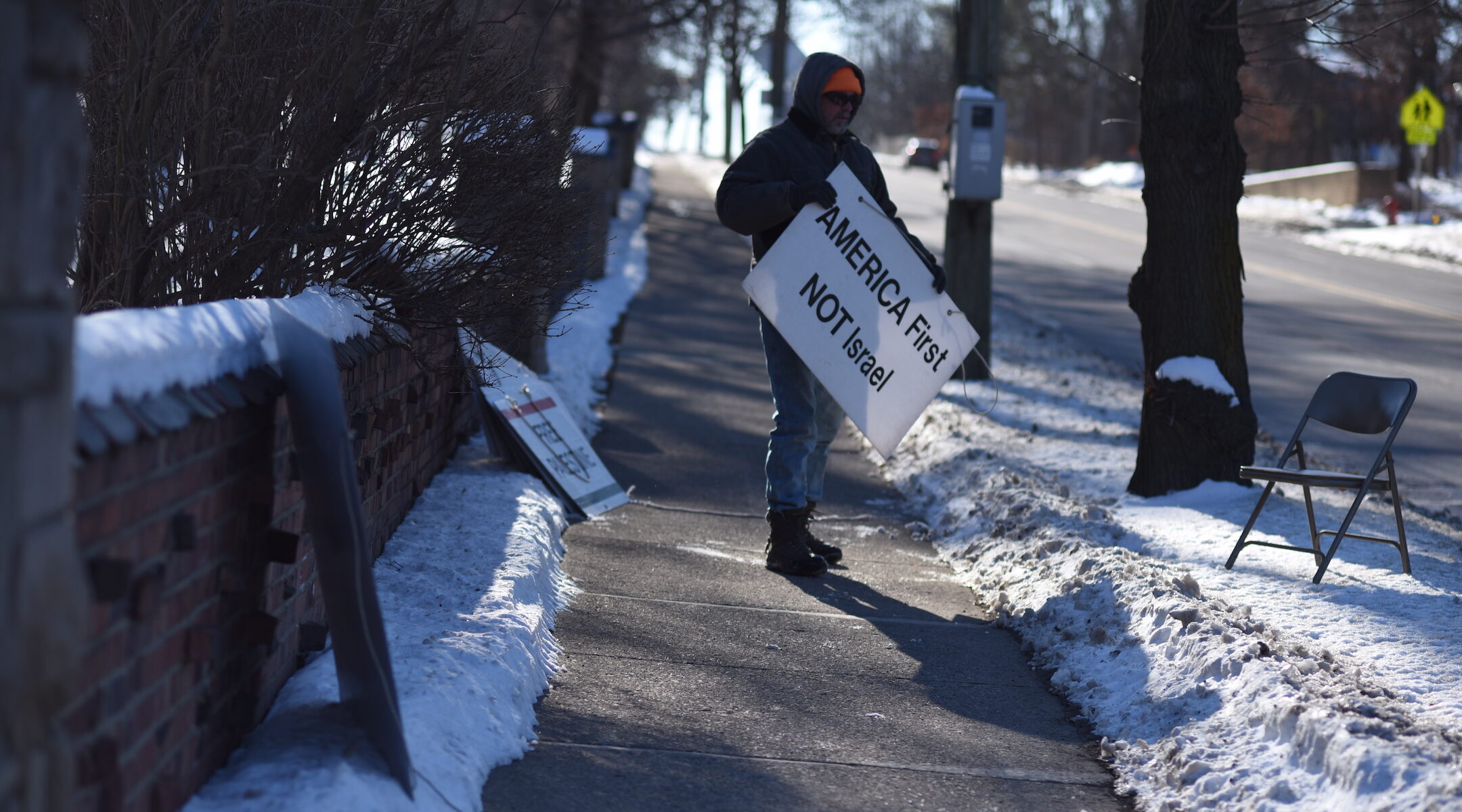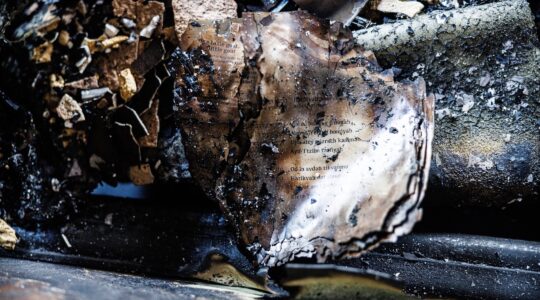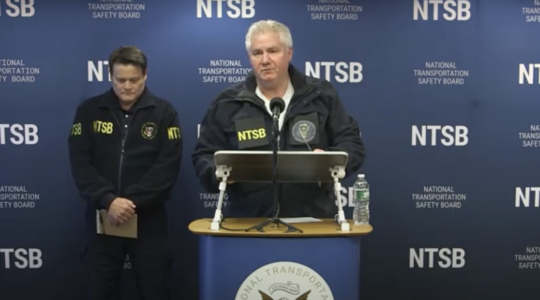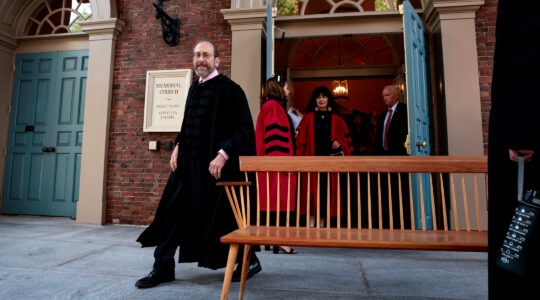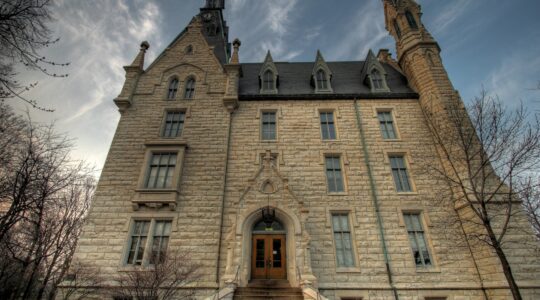ANN ARBOR, Michigan (JTA) – For 18 years, a group of protesters has gathered every Saturday outside one of this city’s synagogues during Shabbat morning services, brandishing signs with slogans such as “Jewish Power Corrupts.”
This week, the city council of Ann Arbor for the first time issued a formal resolution condemning the protests as antisemitic.
The resolution answers the pleas of members of Beth Israel Congregation, a Conservative synagogue just a few blocks from the University of Michigan’s Hillel center, as well as the synagogue’s neighbors. They have appealed to the city for years to take decisive action against the protesters, whom they say are targeting Jews at a house of worship and harassing members of the community.
The protestors’ stated purpose, according to the group’s leader Henry Herskovitz, is “to peacefully dismantle the state of Israel, to end Jewish supremacism there, and to focus on the misuse of Jewish power in America.” Members of the group frequently bring antisemitic signs. Herskovitz, who identifies himself as a former Jew, has also spread Holocaust denial and praised neo-Nazis such as Ernst Zündel and Richard Spencer in blog posts.
A congregant, in addition to a local Holocaust survivor, sued the protesters and the city in 2019, alleging that the protests violate worshippers’ First Amendment rights to safely practice their religion and that the city has not enforced local ordinances that the protesters are violating. That lawsuit was dismissed in September, with the U.S. Court of Appeals ruling that the protesters had a free-speech right to continue their activities.
For years the city declined to get involved in what was happening on Washtenaw Avenue. That changed during the city council meeting on Tuesday, three days after a rabbi and his congregants were taken hostage during services by an antisemitic assailant in Texas.
“The Ann Arbor City Council condemns all forms of antisemitism, and in particular the weekly antisemitic rally on Washtenaw Avenue,” states the resolution, which was approved unanimously by all voting council members. The resolution also “calls upon the persons who rally to express antisemitism on Washtenaw Avenue to renounce extremism, disband, and cease their weekly show of aggressive bigotry.”
The council further “declares its support for the Beth Israel Congregation, their guests, and all members of the Jewish Community in Ann Arbor, each of whom has the right to worship, gather, and celebrate free from intimidation, harassment, and fear of violence.”
“I was just elated,” Beth Israel Rabbi Nadav Caine told the Jewish Telegraphic Agency, noting that, in the wake of the failed lawsuit that had targeted the city directly, “it would be a lot easier not to say anything… I really thought it was bravery and an awareness on their part, that in this time, leaders have to speak up about the hate that happens to people who are not in their group.”
Caine had moved to Ann Arbor in 2018 after previously serving as a rabbi in Poway, California — the site of a 2019 deadly antisemitic shooting at a Chabad house. Seeing the council’s resolution come only three days after the synagogue hostage crisis in Colleyville, Texas, Caine said, “was the yin-yang of extreme emotions.”
The hostage situation had gripped the world’s attention and renewed focus on antisemitic threats targeting Jewish houses of worship. The rabbi held hostage in Texas, Charlie Cytron-Walker, is himself a graduate of the University of Michigan.
But the resolution, which did not mention the events in Texas but did reference antisemitic signs seen at the U.S. Capitol building during the attempted insurrection on Jan. 6, 2021, had actually been in the works for months, Caine said. Most notably, he said, it was spearheaded by the mayor of Ann Arbor himself.
“This did not come from, like, ‘Jewish friends,’” Caine said, adding that he and the congregation had been cautious about not appearing to fit “the Jewish stereotype of the person who’s making my leaders do something they don’t want to do. In fact, that’s kind of what we’re accused of, which is using ‘Jewish power.’”
Reached for comment, Ann Arbor Mayor Christopher Taylor said he couldn’t recall the exact origins of the resolution but that it had come out of “conversations” with the Ann Arbor federation. He said that the city had issued some proclamation against the group in 2004, before he became mayor, but that a 2021 resolution condemning anti-Asian harassment had “resurfaced” the desire to issue something more forceful against this group.
Taylor has spoken out against the protests before and has visited the synagogue to apologize directly to congregants.
The protesters “express antisemitic tropes, they peddle in conspiracy and their goal is to disrupt an innocent congregation,” he told JTA. “That is entirely inconsistent with Ann Arbor’s values, full stop.”
But, Taylor said, the city had little power to take any further action against them. “People have a right to gather on public sidewalks and to speak there,” he said. “We can’t take action in intervention of anyone’s First Amendment right.”
Caine said that Ann Arbor, a college town with a long history of progressive politics and leftist social movements, has a tendency to look the other way when Jews are being targeted.
“It did feel to us, it really did – not just to me – that Ann Arbor was no place for hate, except for hating Jews,” he said.
But the synagogue held out faith that the city would take a stand, which is partly why Beth Israel had declined to get involved in its own congregant’s lawsuit, Caine said.
“We had to consciously ask ourselves, ‘Is the city our enemy?’” he said. “We have to understand that they are not.”

Rabbi Nadav Caine of Congregation Beth Israel in Ann Arbor speaks in support of a city council resolution to condemn ongoing weekly protests outside his synagogue as antisemitic, while behind him another protester displays an anti-Israel sign, Jan, 18, 2022. (Screenshot)
Ann Arbor City Council meetings have themselves been regular demonstration sites for local anti-Israel activists whom observers say often cross the line into antisemitism. Even at Tuesday’s meeting at which the resolution was passed, a group during the public comment period held up an anti-Israel sign for the city council camera behind Caine; synagogue president Deborah Loewenberg Ball; and Eileen Freed, executive director of the Jewish Federation of Greater Ann Arbor, as they spoke in support of the resolution.
The activists also chanted “Stop shooting Palestinians!” after each Jewish speaker finished their remarks.
These Ann Arbor residents, who frequently push the city council to adopt anti-Israel resolutions, also associate with the Beth Israel synagogue protesters. One local anti-Israel activist, environmental toxicologist Mozhgan Savabieasfahani, recently declared her intent to run for city council following an unsuccessful run in 2020 in which she had singled out Jewish donors to her opponents in social media posts.
Although Caine expects the protesters to continue their weekly actions, he said the statement from the city will still help the congregation a great deal.
“When you walk into the synagogue, there’s a pamphlet that explains what’s happening outside,” he said. “So what I now can put in is, ‘I want you to know that this doesn’t represent Ann Arbor’” – and then, he said, he will quote the resolution.
Correction (1/27/22): This story has been updated to reflect that the protest group has not been recorded chanting any slogans during their Saturday morning synagogue protests.
JTA has documented Jewish history in real-time for over a century. Keep our journalism strong by joining us in supporting independent, award-winning reporting.
